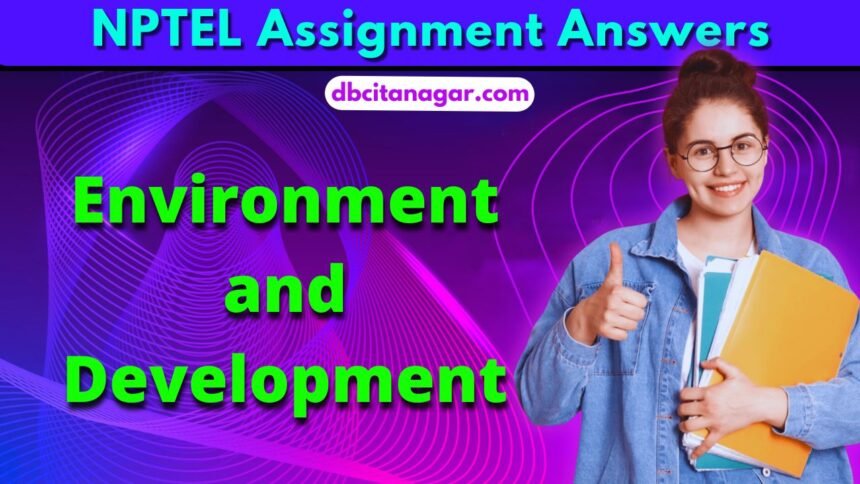NPTEL Environment and Development Week 12 Assignment Answers 2024
1. What distinguishes ‘life projects’ from ‘development initiatives’ in particular?
- Development projects takes into account the place perspectives and life projects are universal in nature
- Life projects takes into account the place perspectives and development projects are universal in nature
- Development projects takes into account the ecological perspectives and life projects are universal in nature
- All of these
Answer :- For Answers Click Here
2. Who among the following argued that indigenous peoples of the Chaco display the moral ecology of hunter–gatherers?
- John Renshaw
- Arturo Escobar
- Deborah McGregor
- Von Bremen
Answer :- For Answers Click Here
3. How does environmentalists often represented the indigenous groups?
- As ideal models, not only of ‘harmony with human’ but also of social and emotional coherence, and continuity
- As ideal models, not only of ‘harmony with human’ but also of social and political coherence, and continuity
- As ideal models, not only of ‘harmony with nature’ but also of social and emotional coherence, and continuity
- As ideal models, not only of ‘harmony with nature’ but also of social and political coherence, and continuity
Answer :-
4. According to Ellen and Harris (2000), what does the term ‘indigenous knowledge’ mean?
- The commonsensical knowledge of a group of people to a given situation, sometimes used interchangeably with commonsensical knowledge
- The knowledge of a group of scientists to a given situation, sometimes used interchangeably with scientific knowledge
- The knowledge of a group of people local to a given situation, sometimes used interchangeably with local knowledge
- None of these
Answer :-
5. What is the ‘life project’ supposed to be?
- Visions of the world and the future that are similar from those embodied by projects promoted by state and markets
- Visions of the world and the future that are distinct from those embodied by projects promoted by state and markets
- Visions of the world and the future that are similar from those embodied by projects promoted by indigenous people
- Visions of the world and the future that are distinct from those embodied by projects promoted by indigenous people
Answer :-
6. What does the traditional environmental knowledge (TEK) refer?
- The knowledge that Indigenous peoples have in relation to the society
- The knowledge that Indigenous peoples have in relation to the universe
- The knowledge that Indigenous peoples have in relation to the religion
- The knowledge that Indigenous peoples have in relation to the environment
Answer :- For Answers Click Here
7. The term ‘indigenous knowledge’ as defined by Ellen and Harris (2000) mean
- The knowledge of a group of scientists to a given situation, sometimes used interchangeably with scientific knowledge
- The knowledge of a group of people local to a given situation, sometimes used interchangeably with local knowledge
- The commonsensical knowledge of a group of people to a given situation, sometimes used interchangeably with commonsensical knowledge
- All of these
Answer :-
8. What was the main objective of the World Commission on Environment and Development (WCED)?
- To enquire into environmental issues in developed countries
- To enquire into environmental issues in developing countries
- To enquire into environmental issues in developed and developing countries
- All of these
Answer :-
9. Sustainable development is a concept derived from
- Conventional Western ideology
- Non-conventional Western ideology
- Conventional Eastern ideology
- Non-conventional Eastern ideology
Answer :-
10. Indigenous views of ‘sustainable development’ are concerned with
- Taking rather than giving
- Giving rather than taking
- Giving and taking
- A balance between giving and taking
Answer :- For Answers Click Here






